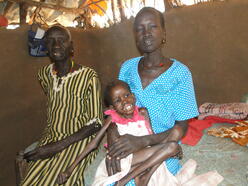Nyathok Deng feels as though Kakuma refugee camp in Kenya has become home away from home. "I first fled my country in 1992 and went back 16 years later in 2008 with hopes for a better tomorrow,” she recounts, referring to the relatively peaceful period leading up to South Sudan's independence from neighbouring Sudan.
But Nyathok yet again has been forced to flee her home when the ongoing political stalemate in the world's newest nation burst into violent conflict between the warring factions. “Now I’m back in this familiar territory, and I don’t know for how long I will be on the run,” she says.
On Jan. 7, Nyathok reentered Kakuma after seven days on the road with her daughter and sick granddaughter, who immediately was referred to the International Rescue Committee hospital and diagnosed with cerebral palsy and acute malnutrition.
“I am sad, I am in so much grief,” she says. “They have killed my only son,” a businessman in Juba, the capital of South Sudan. Full of anger and without hope, Nyathok does not see any reason to go back home. She struggled to rebuild her life there, but the land she farmed was dry and fallow and she depended on relatives to survive.

Her daughter, Amach, however, has gone back to Torit County in South Sudan to search for her other two children, who were lost in the confusion of their escape.
Nyathok takes care of Amach’s youngest daughter, Anyieth, who needs constant attention. “With the help of the IRC, Anyieth is alive,” she says gratefully. “The IRC staff visits her every day for therapy and medical check-ups. I find solace in the visits as they give me hope for good health for Anyieth.”
Like Nyathok, many refugees in the Kakuma camp are uncertain about the political situation at home and fear persecution if they return, or worse, becoming a casualty to a war they don’t understand.
Since the conflict in South Sudan resumed, Kakuma has taken in more than 35,000 refugees, and new arrivals continue to stream in each day, sometimes by the hundreds. To meet the needs of this rapidly increasing refugee population, the IRC has opened an additional outpatient clinic in Kakuma to provide essential health and nutrition services.
An IRC community health promoter regularly checks on Anyieth to ensure she receives all necessary care. The IRC has pledged to continue assisting South Sudanese in dire need of humanitarian assistance, and refugees like Nyathok continue to hope for some resolution to the situation that has taken so much from them.
“As the days go by, I have forgiven my aggressors, and I hope to forget the killing of my son,” says Nyathok. “We have other children to raise and we do not want war anymore.”